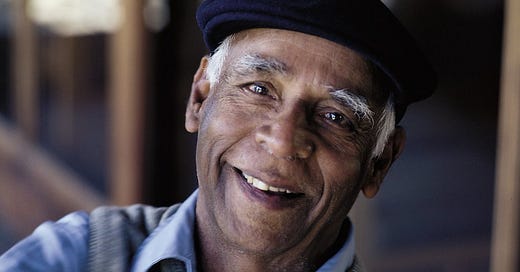Eknath Easwaran and human frailty
I recently came across a troubling article about my spiritual teacher, the late Eknath Easwaran, in the archives of the San Jose Mercury News. Published on April 30, 1989, A Split at the Razor’s Edge was written by reporter John Hubner. It details a 1983 split at Easwaran’s ashram in which some of his followers accused him of sexual harassment, among other things.
“Two of Easwaran’s closest female disciples announced that, for several years, Easwaran had been making sexual advances,” Hubner said. “The women did not accuse Easwaran, who had taken a vow of celibacy, of trying to have intercourse; they said he had repeatedly tried to fondle them. Doubts that had been burning like pilot lights deep within some disciples ignited to full flame.”
The other accusations against Easwaran were a little less specific and inflammatory. In short, some of the people who left his ashram in 1983 believed Easwaran had let the adoration of his followers go to his head. They thought he had lost a good deal of his earlier humility. Easwaran, in their view, placed more emphasis on devotion to one’s teacher than he had in decades past.
Reading Hubner’s piece was a disappointing experience. On the other hand, it reinforced a disagreement I’ve always had with Easwaran. As far as I could tell, he believed human spiritual perfection was an achievable goal, even if it took many lives to get there. I think it’s an ideal we work toward but ultimately can never reach. We’re all deeply flawed, myself very much included.
I’m not really sure what this information will mean for my spiritual practice going forward. For some time, I’ve wanted to explore Unitarian Universalism and Quakerism, both of which can be found in Hartford. Perhaps I will finally take the leap and try these different paths. The truth is, though, meditation at home might be a better fit with my current responsibilities. I’m still thinking about it all.
I also don’t want to throw the baby out with the bath water, so to speak. Whatever Easwaran’s personal flaws, I’ve found his writing to be immensely useful in my journey so far from dogmatic atheism to loosely-defined perennialism. Easwaran’s separation of the metaphors we use to talk about God from the indescribable reality they seek to evoke helped me take religion seriously.
Lord knows I’m profoundly limited in a host of ways, and will be until the day I die, but I like to think Easwaran’s writing and meditation program has made me a little kinder, a little calmer, and a little more forgiving — of others, and, as an inevitable result, myself. But perhaps most importantly, Easwaran has helped make me a little more patient, a quality I’ve desperately needed in recent years.
I’ve come to rely on his practical, written guidance and spiritual program of meditation and repetition of a mantram. And, as I’ve mentioned before, Easwaran is my mother’s favorite spiritual author. Being involved in his Blue Mountain Center of Meditation has made me feel closer to her. So, again, I don’t really know what comes next for me in terms of my spiritual practice.


